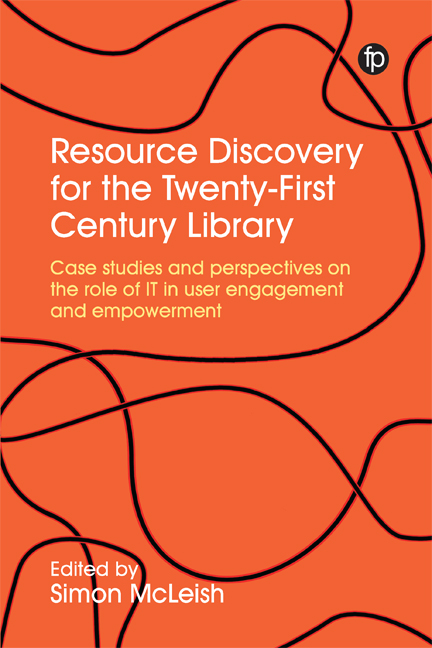Book contents
- Frontmatter
- Contents
- Figures and Tables
- Contributors
- Foreword: Library Discovery Directions
- 1 Introduction: Technology and Resource Discovery
- 2 Flipping the Catalogue: Taking Resource Discovery to the Next Level
- 3 Breaking the Record: Liberating Data into Knowledge at the National Library Board of Singapore
- 4 Case Study: Clearing Library Discovery-to-Access Pathways for IEEE Content
- 5 Case Study: Putting Discovery at the Heart of the Library Experience
- 6 Investigating Resource Discovery Needs at the University of Oxford
- 7 ‘Why Can’t you Just Use Google?’
- 8 Exposing Collections and Resources Effectively
- 9 Open Source Discovery using Blacklight at the University of Hull
- 10 A World of Curated Knowledge: Leveraging the Wider Semantic Web to Enhance Library Discovery
- 11 Cultural Discovery: Trends and Futures
- 12 Discovering the Future
- Editorial Afterword
- Index
12 - Discovering the Future
Published online by Cambridge University Press: 23 July 2020
- Frontmatter
- Contents
- Figures and Tables
- Contributors
- Foreword: Library Discovery Directions
- 1 Introduction: Technology and Resource Discovery
- 2 Flipping the Catalogue: Taking Resource Discovery to the Next Level
- 3 Breaking the Record: Liberating Data into Knowledge at the National Library Board of Singapore
- 4 Case Study: Clearing Library Discovery-to-Access Pathways for IEEE Content
- 5 Case Study: Putting Discovery at the Heart of the Library Experience
- 6 Investigating Resource Discovery Needs at the University of Oxford
- 7 ‘Why Can’t you Just Use Google?’
- 8 Exposing Collections and Resources Effectively
- 9 Open Source Discovery using Blacklight at the University of Hull
- 10 A World of Curated Knowledge: Leveraging the Wider Semantic Web to Enhance Library Discovery
- 11 Cultural Discovery: Trends and Futures
- 12 Discovering the Future
- Editorial Afterword
- Index
Summary
Preface: a resource discovery dystopia
David De Roure
As long as the centuries continue to unfold, the number of books will grow continually, and one can predict that a time will come when it will be almost as difficult to learn anything from books as from the direct study of the whole universe. It will be almost as convenient to search for some bit of truth concealed in nature as it will be to find it hidden away in an immense multitude of bound volumes. When that time comes, a project, until then neglected because the need for it was not felt, will have to be undertaken.
Denis Diderot, Encyclopédie (1755)In the 2000s everyone was talking about ‘information overload’, fearing more data, more channels, more interruption. Discussion declined with the rise of personalisation – in search results, in social media recommendations. Filtering was the answer: ‘It's not information overload. It's filter failure’ (Shirky, 2008). By 2011 the risks of personalisation had been acknowledged, with the realisation that academics were living in ‘filter bubbles’ where algorithms gave them what they wanted – and sealed them off from new ideas. This led to community ‘echo chambers’ where ideas were amplified and self-reinforced by the penumbra of relevant information.
By 2015 the situation had deteriorated further. The digital marketing ecosystem had blurred with scholarly resource discovery. Algorithms made recommendations not just on reading habits but to maximise publishing corporations’ income – purportedly to fulfil their legal obligation to shareholders’ interests. In distorting information discovery, it corrupted the very process of research, bringing accusations of algorithmic censorship of scientific work. Universities were not far behind the publishers in privileging the academic outputs that would maximise their research income through optimising locations and citations, an increasingly automated process. A competitive ecosystem of algorithms arose – culminating in the infamous 2020 ‘Russell Algorithm’ court ruling mandating transparency in search technologies.
Research was increasingly conducted in silico, and rising automation increasingly bypassed the human – especially as rewards went to those first past the post with research results. As machines became the predominant producers and consumers of research content, they became the primary users of real time resource discovery algorithms. While liberating for humans, this also denied critical reflection and challenge – they only got to see what machine-learning algorithms, and those who configured their behaviour, wanted them to see. Research methods had become built into our knowledge infrastructure, unchallenged.
- Type
- Chapter
- Information
- Resource Discovery for the Twenty-First Century Library , pp. 177 - 190Publisher: FacetPrint publication year: 2020



